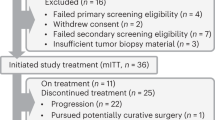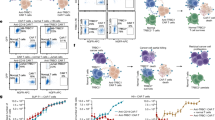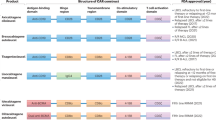Abstract
219 HIV-negative adults ≤70 years with primary CNS lymphoma (PCNSL) were enrolled in the randomized IELSG32 trial. Enrolled patients were randomly assigned to receive methotrexate-cytarabine (arm A), or methotrexate-cytarabine-rituximab (B), or methotrexate-cytarabine-thiotepa-rituximab (MATRix; arm C). A second randomization allocated patients with responsive/stable disease to whole-brain irradiation (WBRT) or carmustine-thiotepa-conditioned autologous transplantation (ASCT). First results, after a median follow-up of 30 months, showed that MATRix significantly improves outcome, with both WBRT and ASCT being similarly effective. However, sound assessment of overall survival (OS), efficacy of salvage therapy, late complications, secondary tumors, and cognitive impairment requires longer follow-up. Herein, we report the results of this trial at a median follow-up of 88 months. As main findings, MATRix was associated with excellent long-lasting outcome, with a 7-year OS of 21%, 37%, and 56% respectively for arms A, B, and C. Notably, patients treated with MATRix and consolidation had a 7-year OS of 70%. The superiority of arm B on arm A suggests a benefit from the addition of rituximab. Comparable efficacy of WBRT and ASCT was confirmed. Salvage therapy was ineffective; benefit was recorded only in patients with late relapse re-treated with methotrexate. Eight (4%) patients developed a second cancer. Importantly, MATRix and ASCT did not result in higher non-relapse mortality or second tumors incidence. Patients who received WBRT experienced impairment in attentiveness and executive functions, whereas patients undergoing ASCT experienced improvement in these functions as well as in memory and quality of life.
This is a preview of subscription content, access via your institution
Access options
Subscribe to this journal
Receive 12 print issues and online access
$259.00 per year
only $21.58 per issue
Buy this article
- Purchase on Springer Link
- Instant access to full article PDF
Prices may be subject to local taxes which are calculated during checkout


Similar content being viewed by others
References
Ferreri AJ, Cwynarski K, Pulczynski E, Ponzoni M, Deckert M, Politi LS, et al. Chemoimmunotherapy with methotrexate, cytarabine, thiotepa, and rituximab (MATRix regimen) in patients with primary CNS lymphoma: results of the first randomisation of the International Extranodal Lymphoma Study Group-32 (IELSG32) phase 2 trial. Lancet Haematol. 2016;3:e217–27.
Ferreri AJM, Cwynarski K, Pulczynski E, Fox CP, Schorb E, La Rosee P, et al. Whole-brain radiotherapy or autologous stem-cell transplantation as consolidation strategies after high-dose methotrexate-based chemoimmunotherapy in patients with primary CNS lymphoma: results of the second randomisation of the International Extranodal Lymphoma Study Group-32 phase 2 trial. Lancet Haematol. 2017;4:e510–23.
Scordo M, Wang TP, Ahn KW, Chen Y, Ahmed S, Awan FT, et al. Outcomes associated with thiotepa-based conditioning in patients with primary central nervous system lymphoma after autologous hematopoietic cell transplant. JAMA Oncol. 2021;7:993–1003.
Ferreri AJ, Illerhaus G. The role of autologous stem cell transplantation in primary central nervous system lymphoma. Blood. 2016;127:1642–9.
Illerhaus G, Kasenda B, Ihorst G, Egerer G, Lamprecht M, Keller U, et al. High-dose chemotherapy with autologous haemopoietic stem cell transplantation for newly diagnosed primary CNS lymphoma: a prospective, single-arm, phase 2 trial. Lancet Haematol. 2016;3:e388–97.
Kasenda B, Loeffler J, Illerhaus G, Ferreri AJ, Rubenstein J, Batchelor TT. The role of whole brain radiation in primary CNS lymphoma. Blood. 2016;128:32–6.
Houillier C, Taillandier L, Dureau S, Lamy T, Laadhari M, Chinot O, et al. Radiotherapy or Autologous Stem-Cell Transplantation for Primary CNS Lymphoma in Patients 60 Years of Age and Younger: Results of the Intergroup ANOCEF-GOELAMS Randomized Phase II PRECIS Study. J Clin Oncol. 2019;37:823–33.
Correa DD, Braun E, Kryza-Lacombe M, Ho KW, Reiner AS, Panageas KS, et al. Longitudinal cognitive assessment in patients with primary CNS lymphoma treated with induction chemotherapy followed by reduced-dose whole-brain radiotherapy or autologous stem cell transplantation. J Neurooncol. 2019;144:553–62.
Correa DD, Maron L, Harder H, Klein M, Armstrong CL, Calabrese P, et al. Cognitive functions in primary central nervous system lymphoma: literature review and assessment guidelines. Ann Oncol. 2007;18:1145–51.
Cheson BD, Pfistner B, Juweid ME, Gascoyne RD, Specht L, Horning SJ, et al. Revised response criteria for malignant lymphoma. J Clin Oncol. 2007;25:579–86.
Yin X, Xu A, Huang Z, Fan F, Wang Y, Chen L, et al. The relationship among primary anatomic subsite and risk and distribution of second malignant neoplasms in patients with stage I/II diffuse large B-cell lymphoma: An analysis of the surveillance, epidemiology, and end results database. Transl Oncol. 2021;14:101106.
Frontzek F, Ziepert M, Nickelsen M, Altmann B, Glass B, Haenel M, et al. Rituximab plus high-dose chemotherapy (MegaCHOEP) or conventional chemotherapy (CHOEP-14) in young, high-risk patients with aggressive B-cell lymphoma: 10-year follow-up of a randomised, open-label, phase 3 trial. Lancet Haematol. 2021;8:e267–77.
Correa DD, Shi W, Abrey LE, Deangelis LM, Omuro AM, Deutsch MB, et al. Cognitive functions in primary CNS lymphoma after single or combined modality regimens. Neuro Oncol. 2012;14:101–8.
Doolittle ND, Korfel A, Lubow MA, Schorb E, Schlegel U, Rogowski S, et al. Long-term cognitive function, neuroimaging, and quality of life in primary CNS lymphoma. Neurology. 2013;81:84–92.
Schorb E, Fox CP, Kasenda B, Linton K, Martinez-Calle N, Calimeri T, et al. Induction therapy with the MATRix regimen in patients with newly diagnosed primary diffuse large B-cell lymphoma of the central nervous system—an international study of feasibility and efficacy in routine clinical practice. Br J Haematol. 2020;189(5):879–887.
Omuro AMP, DeAngelis LM, Karrison T, Bovi JA, Rosenblum M, Corn BW, et al. Randomized phase II study of rituximab, methotrexate (MTX), procarbazine, vincristine, and cytarabine (R-MPV-A) with and without low-dose whole-brain radiotherapy (LD-WBRT) for newly diagnosed primary CNS lymphoma (PCNSL). J Clin Oncol. 2020; 38: (suppl): abstr 2501.
Batchelor T, Giri S, Ruppert AS, Bartlett NL, Hsi ED, Cheson BD, et al. Myeloablative versus non-myeloablative consolidative chemotherapy for newly diagnosed primary central nervous system lymphoma: Results of CALGB 51101 (Alliance). J Clin Oncol. 2021; 39 (suppl 15); abstr 7506.
Schorb E, Finke J, Ferreri AJ, Ihorst G, Mikesch K, Kasenda B, et al. High-dose chemotherapy and autologous stem cell transplant compared with conventional chemotherapy for consolidation in newly diagnosed primary CNS lymphoma-a randomized phase III trial (MATRix). BMC Cancer. 2016;16:016–2311-4.
Bromberg JEC, Issa S, Bakunina K, Minnema MC, Seute T, Durian M, et al. Rituximab in patients with primary CNS lymphoma (HOVON 105/ALLG NHL 24): a randomised, open-label, phase 3 intergroup study. Lancet Oncol. 2019;20:216–228.
Schmitt AM, Herbrand AK, Fox CP, Bakunina K, Bromberg JEC, Cwynarski K, et al. Rituximab in primary central nervous system lymphoma-A systematic review and meta-analysis. Hematol Oncol. 2019;37:548–557.
Houillier C, Soussain C, Ghesquieres H, Soubeyran P, Chinot O, Taillandier L, et al. Management and outcome of primary CNS lymphoma in the modern era: An LOC network study. Neurology. 2020;94:e1027–39.
Langner-Lemercier S, Houillier C, Soussain C, Ghesquieres H, Chinot O, Taillandier L, et al. Primary CNS lymphoma at first relapse/progression: characteristics, management, and outcome of 256 patients from the French LOC network. Neuro Oncol. 2016;18:1297–303.
Nguyen PL, Chakravarti A, Finkelstein DM, Hochberg FH, Batchelor TT, Loeffler JS. Results of whole-brain radiation as salvage of methotrexate failure for immunocompetent patients with primary CNS lymphoma. J Clin Oncol. 2005;23:1507–13.
Plotkin SR, Betensky RA, Hochberg FH, Grossman SA, Lesser GJ, Nabors LB, et al. Treatment of relapsed central nervous system lymphoma with high-dose methotrexate. Clin Cancer Res. 2004;10:5643–6.
Acknowledgements
We are indebted to our patients and their families. The IELSG32 academic trial was sponsored by the IELSG and was conducted without commercial funding. We thank the investigators, research nurses, and study coordinators at each study center. We particularly thank hematologists, oncologists, neuroradiologists, radiation oncologists, pathologists, and psychologists from all centers for their generous commitment and sustained scientific collaboration. We appreciate the excellent technical assistance of the clinical trial offices of the Fondazione Italiana Linfomi (Modena and Alessandria, Italy), of Cancer Research UK (Southampton, UK), Universitätsklinikum Freiburg (Freiburg, Germany), Universitetshospital Aarhus (Aarhus, Denmark), as well as the administrative support in data collection and study conduction from the clinical project manager and central study team at the IELSG Coordinating Center (Bellinzona, Switzerland). We also express gratitude to the members of the independent data monitoring board of the study. The IELSG32 study was supported in part by grants from the Agenzia Italiana del Farmaco (Ricerca Indipendente FARM99FS3Y), Cancer Research UK (C36711/A12115; CRUK/10/023), Oncosuisse (KLS 02399-02-2009), and the Swiss National Science Foundation (31003B_132924).
Author information
Authors and Affiliations
Consortia
Contributions
AJMF, KC, EP, JF, FC, EZ, and GI were responsible for designing the review protocol, writing the protocol and report, analysing data, interpreting results, and writing the manuscript. CC and MF was responsible for revision and analysis of neuropsychological tests and results interpretation. AN performed statistical analysis. CPF, ES, PLR, MB, AF, FI, MK, AR, CH, PWJ, KML, TP, JSG, MB, GH, UK, SS, JP, AT, LO, FP, MZ, SWK, HJS, BH, MR, JS, LT, GC, and EP registered and treated patients, and provided clinical data. MP and MD performed central pathology review. LSP performed central radiology review. AF, KeC, EB, and NI acted as data managers and study coordinators, contributed to data extraction and provided feedback on the report. All the authors approved manuscript and submission.
Corresponding author
Ethics declarations
Competing interests
The authors declare no competing interests.
Additional information
Publisher’s note Springer Nature remains neutral with regard to jurisdictional claims in published maps and institutional affiliations.
Supplementary information
Rights and permissions
About this article
Cite this article
Ferreri, A.J.M., Cwynarski, K., Pulczynski, E. et al. Long-term efficacy, safety and neurotolerability of MATRix regimen followed by autologous transplant in primary CNS lymphoma: 7-year results of the IELSG32 randomized trial. Leukemia 36, 1870–1878 (2022). https://doi.org/10.1038/s41375-022-01582-5
Received:
Revised:
Accepted:
Published:
Issue Date:
DOI: https://doi.org/10.1038/s41375-022-01582-5
This article is cited by
-
18F-FACBC and 18F-FDG PET/MRI in the evaluation of 3 patients with primary central nervous system lymphoma: a pilot study
EJNMMI Reports (2024)
-
Survival outcomes and treatment experience of 124 patients with primary central nervous system lymphoma
Strahlentherapie und Onkologie (2024)
-
Primary central nervous system lymphoma
Nature Reviews Disease Primers (2023)
-
Impact of thiotepa dose-intensity in primary diffuse large B-cell lymphoma of the central nervous system undergoing autologous hematopoietic cell transplant with thiotepa/carmustine conditioning
Bone Marrow Transplantation (2023)
-
Long term outcomes in older patients with primary central nervous system lymphoma: an analysis of the Texas Cancer Registry
Annals of Hematology (2023)



